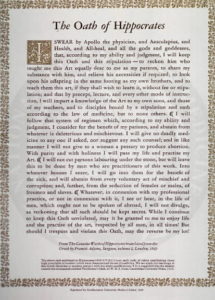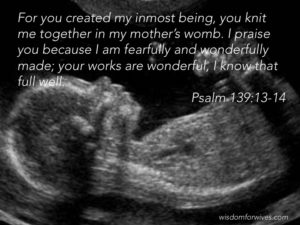History
 The practice of abortion has been common throughout history. However, many cultures considered abortion to be a serious crime. Part of the Hippocratic Oath, which most doctors endorse, states in part, “I will not give a woman a [drug] to produce an abortion.” The Jewish people were historically against the practice, as were the leaders of the early church. Until a few decades ago, most laws in the US recognized that a woman was “with child” at the moment of conception. In the mid-1960’s, abortion laws became more tolerant in the US. The Supreme Court legalized abortion in the landmark Roe v. Wade case in January 1973.
The practice of abortion has been common throughout history. However, many cultures considered abortion to be a serious crime. Part of the Hippocratic Oath, which most doctors endorse, states in part, “I will not give a woman a [drug] to produce an abortion.” The Jewish people were historically against the practice, as were the leaders of the early church. Until a few decades ago, most laws in the US recognized that a woman was “with child” at the moment of conception. In the mid-1960’s, abortion laws became more tolerant in the US. The Supreme Court legalized abortion in the landmark Roe v. Wade case in January 1973.
Definitions
Abortion is the expulsion or removal of a child from the uterus at a stage of development when it is incapable of independent survival, resulting in its death. A “zygote” is a fertilized egg, the earliest form of the baby. “Embryo” refers to a child at the early stages of development. “Fetus” refers to a baby after the first three months of life. Most abortions are performed within the first trimester (3 months).
The Procedure
Abortion is likely one of the most barbaric and inhumane practices ever devised by sinful man. Normally a surgical instrument of some sort is inserted into the womb. The doctor then uses the instrument to cut the unborn baby in pieces. Sometimes a sharp-tipped vacuum pipe is used to both cut the baby up and suck him out. Another process injects a strong salt solution into the fluid surrounding the baby. The salt poisons the child to death. Perhaps the most gruesome method is the D & E, or “partial birth abortion,” in which the doctor delivers the baby’s body except for the head. He then kills the baby, collapses its skull, and delivers it the rest of the way. The newest method of abortion is in the form of a pill, RU 486. This drug causes the uterus to shed its lining, which dislodges the fertilized egg or embryo, all of which is expelled. RU 486 is more than 95% effective in terminating a pregnancy within the first 7 weeks.
The Ethics of Abortion
The ethics of abortion revolves around the question of when an unborn child becomes a genuine human being, deserving of the normal protections that all other humans expect.
Typical “pro-choice” arguments:
- A woman has the right to choose what happens to her own body.
- The fetus is not a human being. It is a glob of tissue, potentially human, but not fully human. The fetus is not an independent person but is totally dependent on the body of the woman for its life support and is physically attached to her. Only after birth can the baby be considered its own person.
- An unwanted pregnancy would be inconvenient, expensive, and may needlessly endanger the life of the mother.
- If unwanted babies are not aborted, they will likely be raised in unloving, abusive families. Motherhood should never be punishment for having sex.
- An embryo or fetus aborted in the first trimester cannot feel pain because its nervous system is not yet functioning to that level. Medical researchers and medical literature say that the pathways in the brain that permit the sensation of pain develop after 30 weeks. So killing the fetus before that does not cause pain.
- Laws have never stopped abortion, but only banished it to back-alley butchers. Abortions will happen whether the practice is legal or not. It’s best to make it legal to protect all parties involved.
 Biblical Principles Supporting the Humanity of an Unborn Child
Biblical Principles Supporting the Humanity of an Unborn Child
There are several lines of evidence in the Bible that strongly suggest that an unborn child is fully human and just as valuable as anyone else.
1. In the Bible, Personal Pronouns and Proper Names are Applied to Unborn Children.
Psalm 51:5 – “Surely I was sinful at birth, sinful from the time my mother conceived me.” Psalm 139:13 – “For you created my inmost being; you knit me together in my mother’s womb.” Luke 1:44 – “As soon as the sound of your voice reached my ears, the baby in my womb leaped for joy.”
Human emotion is explicitly attributed to the unborn John. Emotion is an aspect of personality. Thus it would seem that the Bible attributes personality and therefore personhood, to the unborn.
2. The OT Law Views the Unborn as Fully Human Persons.
Exodus 21:22-25 – The point of the passage is that both the mother and the unborn child are of equal value. If neither the premature child nor the mother is hurt, a simple fine is levied. However, if either is hurt, the guilty party will be punished in kind, even to the point of death. Thus the Mosaic Law views both the unborn and the adult as equally human, equally valuable. “The text then gives no credence to abortion of the fetus but rather reveals the sanctity of both adult and fetal life.”
3. The Bible Indicates that Humanness is Transferred to the Unborn Child. 
Psalm 51:5 – “Surely I was sinful at birth, sinful from the time my mother conceived me.” This verse strongly supports the idea that a fetus is indeed an individual human person. A glob of non-human tissue cannot be “sinful.” But David asserts that he was sinful from the time of conception, which could be true only if he were fully human from that point. Every aspect of the parents’ humanity is transferred to the newly conceived child. The fetus is by nature as fully sinful and as fully human as his parents.
4. God’s Interest in a Person Begins Long Before Birth.
Psalm 139:13-16 – This passage strongly suggests that much more is going on in the womb than just the growth of a bunch of cells. David attributes all the activity to God—God possessed, covered and made David while still in the womb. God skillfully formed the baby’s body. God even saw him prior to birth. His “embryo” (unformed body) and even the course of his life was determined. Hence, in God’s eyes, even an unborn baby is a person.
Jer 1:5-“Before I formed you in the womb I knew you, before you were born I set you apart; I appointed you as a prophet to the nations.” Isa 49:1 – Before I was born the LORD called me; from my birth he has made mention of my name.”
The general teaching of the Bible is that a child is human, whether before birth or after. Hence, the taking of the life of an unborn child is murder.
 – David De Bruyn, Professor of Church History, Shepherds’ Seminary Africa
– David De Bruyn, Professor of Church History, Shepherds’ Seminary Africa

